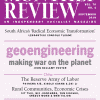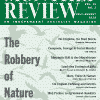
On the Nature of the Chinese Economic System
There is considerable debate within China about the nature of the economy, including recognition of tendencies toward state capitalism. Consequently, most writers focus theorization of the many possible paths the economy could take—whether toward or away from capitalism. The present article takes a step further, arguing that the Chinese system today still contains some key components of socialism and is compatible with a market, or market-based, socialism that is clearly distinct from capitalism. | more…

A Subaltern Perspective on China’s Ecological Crisis
The modernization paradigm pursued by China has tended to privilege industry over agriculture, urban over rural, and the middle class over the subaltern, with the country’s growth statistics and policy emphases accordingly geared to such a paradigm. This has resulted in almost mindless degradation of nature. The key question China faces is thus not one of more progress or more growth, but of the multiple tasks of reversing the dire damage already done to its ecology, society, and culture. | more…

The Radicalization of Dashiell Hammett
In his review of Hardboiled Activist: The Work and Politics of Dashiell Hammett by Ken Fuller, Albert Ruben debunks popular arguments about Hammett’s consistent radicalism. Instead, he highlights Fuller’s research to point to Hammett’s process of radicalization—from nihilism to communism—and the events that shaped his life and work. | more…

September 2018 (Volume 70, Number 4)
Founded in the late 1960s and recently revived, the radical organization Science for the People did—and does—far more than just publish a magazine. Chapters are forming around the country, including physicists, engineers, and biologists, as well as representatives of other scientific groupings and social movements. We at MR welcome the return of this great publication and movement of the U.S. left. | more…

Making War on the Planet
The dangers posed by climate change have inspired a desperate search for technological fixes in the form of geoengineering—massive human interventions to manipulate the entire climate or planet. But as long as the dominant strategy for addressing global warming remains subordinated to the ends of capital accumulation, any attempt to implement such schemes will prove fatal to humanity. | more…

South Africa’s ‘Radical Economic Transformation’
The South African political class appears to have finally recognized the depth of the crisis into which the country’s capitalist system has sunk. Can the government’s new Radical Economic Transformation program begin to address the profound inequalities that remain at the heart of South African society? | more…

The Reserve Army of Labor in China’s Economy, 1991–2015
Since the late 1990s, China’s economic expansion has depended on an immense pool of cheap labor. Today, as wages increase and manufacturing operations leave the country, there are constant complaints about shortages of peasant workers. But has China really entered a new era of labor shortage? | more…

Rural Communities and Economic Crises in Modern China
Throughout China’s nearly seventy-year history of industrialization and financialization, whenever the cost of an economic crisis could be transferred to the rural sector, capital-intensive urban industries have had a “soft landing” and existing institutional arrangements have been maintained—a pattern that continues today. We argue that Chinese peasants and rural communities have rescued the country from no fewer than ten such economic crises. | more…

She Works Like a Man; If a Woman’s Word
Linda Backiel is a criminal defense attorney practicing in San Juan, Puerto Rico. | more…

‘The Deadly Implications of Capital for the Human Habitat’

Beyond the Class–Race Binary
In his insightful new book, the historian David Roediger raises critical questions for scholar-activists seeking to understand white racism and contemporary capitalism and its class realities. He joins a long line of thinkers who have clearly recognized the need for both specifically racial and more universal, class-oriented programs of major social and economic change. | more…

July-August 2018 (Volume 70, Number 3)
This special issue is dedicated to developing the ecological critique embodied in Marx’s theory of “metabolic rift.” Each article uses the metabolic rift perspective to uncover core contradictions of capitalism, as well as possible paths toward a new system—one that will meet human needs while protecting the earth and future generations. | more…

The Robbery of Nature
Marx’s notion of “the robbery of the soil” is intrinsically connected to the rift in the metabolism between human beings and the earth. To get at the complexities of his metabolic rift theory, it is useful to look separately at the issues of the robbery and the rift, seen as separate moments in a single development. | more…